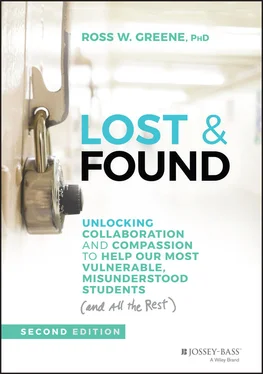Administrators, you're in the mix, too. You didn't sign up to be a police officer, but that doesn't mean you don't often feel like one. The classroom teachers who are sending kids to the office expect action and are frequently quite clear about what the action should be: powerful adult-imposed consequences, straight from the school's discipline handbook, that will finally get the message through and ensure that the well-behaved students (and their parents) know that the situation is being taken seriously. The only problem, of course, is that all those consequences aren't working. No one is more acutely aware of that than you. And there are much more effective, compassionate ways to demonstrate that the situation is being taken seriously.
“I remember my first few years as assistant principal before implementing CPS in our school. Students were lined up outside my office for various behavioral issues on a frequent basis. Since I thought of myself as the ‘fix-it’ person, my goal was to resolve the situation as quickly as possible. I wanted to support the teacher and help the student become more successful, but the same students, often sent from the same teachers, seemed to return over and over again. I always felt that there had to be a better way to do this. ”
—RYAN, PRINCIPAL
Also in the mix are school psychologists, counselors, and social workers, the people who are officially on the hook for “fixing” students with concerning behaviors. It's often said that those students fall outside the expertise and responsibility of the general education classroom teacher, and therefore they fall (or are sent) into your caseload. And there are lots of 'em. And you may be covering several different buildings. And your testing load is intense. It's hard not to become overwhelmed, jaded, and burned out.
Apparently, we're talking about everyone. And that's good, because it's going to take everyone to turn things around. But when we do turn things around, everyone benefits.
So now, the question: Are the ways in which your school is assessing and dealing with students with concerning behaviors truly helping? If not, you need to find a different way.
That starts with taking a look at what you've been thinking about kids with concerning behaviors. The lenses through which you're viewing these kids will have a major influence on the stance you take toward them and the strategies you employ in your efforts to help. It's a classic case of What you see is what you get . What we're thinking and seeing and doing should be a reflection of the mountain of research that has accumulated over the past forty to fifty years on kids with concerning behaviors.
Here's what we've been thinking : kids with concerning behaviors are lacking motivation . Here's what the research that's accumulated over the past forty to fifty years tells us: they're lacking skills . And that is a game-changer.
“When I first learned that concerning behaviors were due to lagging skills, it was like a lightbulb went on. It's what I'd been thinking; I just never really had words for it.”
—KATIE, LEARNING CENTER TEACHER
Here's what we've been doing : we've been carefully documenting a student's concerning behaviors —through behavior checklists, behavior observations, functional behavior assessments (FBAs)—and we've been trying to modify those behaviors through administration of consequences. Here's what we should be doing instead: identifying the problems that are causing those behaviors and solving them.
And those two seismic shifts are going to change the narrative and the outcomes for a lot of kids.
As you may already know, the Collaborative & Proactive Solutions (CPS) model described in this book operates on a very important key theme:
KIDS DO WELL IF THEY CAN
This is the belief that if the kid could respond to problems and frustrations adaptively, he would . If he's not responding adaptively, he must be lacking the skills to respond adaptively. That's why he's screaming, swearing, hitting, kicking, spitting, throwing, destroying, or running out of the building. But he's not exhibiting those concerning behaviors all the time; he only exhibits those behaviors when there are expectations he's having difficulty meeting. So the behavior is just the signal, just the means by which the student is communicating that there's an expectation he's having difficulty meeting. If caregivers are focused only on modifying behavior, then all they're modifying is the signal. But they're not solving any of the problems that are causing the signal. So one of the most important things you can do for a student with concerning behaviors is to figure out what skills he's lacking. The other important thing you can do is identify the expectations the student is having difficulty meeting. In the CPS model, those unmet expectations are referred to as unsolved problems .
“Working in a building where behavioral incentives have been a traditional part of the culture, I often have staff members question the philosophy of extrinsic versus intrinsic motivation. Teachers would ask, ‘Shouldn't students want to do well for the sake of doing well, not just to earn something?’ The CPS model answers that question with a resounding yes with the fundamental beliefs that kids do well if they can , not kids do well if they want to . When you start with that shift in thinking, it leads you in different and more productive directions to help and support students in finding success.”
—RYAN, PRINCIPAL
Here's another key theme, and it's related to the first:
DOING WELL IS PREFERABLE
This is the belief that human beings—including kids with concerning behaviors—have a strong preference for doing well (as opposed to doing poorly). In other words, they aren't responding maladaptively to problems and frustrations because they're seeking attention, or manipulating, or coercing us into capitulating to their wishes, or because they're lazy or unmotivated. Yet, in many schools, these characterizations are alive and well, along with the belief that a student's concerning behaviors are working for him.
Working? How? According to conventional notions about the function of behavior, concerning behavior helps a student get something (for example, attention) and helps him escape and avoid tasks that are tedious, challenging, uncomfortable, or scary. If those are the lenses you're wearing, then it will be your mission to prove to the student that his concerning behavior isn't going to work and to model and reinforce replacement behaviors that you believe will work better, typically through use of rewards and punishments.
But wait. Don't all of us get, escape, and avoid? If so, then the question isn't whether the student is getting, escaping, and avoiding, but rather why the student is going about getting, escaping, and avoiding in such a maladaptive manner . And now you have the answer, thanks to the mountain of research: because he's lacking the skills to get, escape, and avoid in a more adaptive fashion .
What skills does the research tell us kids with concerning behaviors are lacking? For the time being, we're going to sacrifice precision for efficiency: flexibility/adaptability, frustration tolerance/emotion regulation , and problem solving . Concerning behaviors typically occur when those skills are being demanded. And those skills are being demanded when (you now know this) kids (and the rest of us) are having difficulty meeting certain expectations . You'll be learning how to identify those lagging skills and unsolved problems in chapter 4.
Читать дальше












